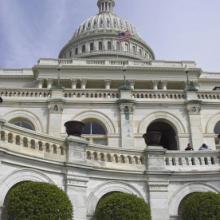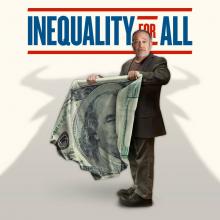Economic Justice
People around the country have taken notice of the #FaithfulFilibuster and want to lend their voices. From Pastor Sarah Trone Garriot in Des Moines, Iowa: "Since we couldn't be in Washington to join you, a few of us pastors got together and visited our Iowa Representative's office."
After reading through select Bible verses, the group read the following statement:
To the Honorable Representative Tom Latham:
We believe that the recent government shutdown is not just a failure of the process of governance. This shutdown is born of the failure to follow Jesus’ commandment to “love our neighbor.” (Luke 10:25-37)
We have witnessed hard hearts as our elected representatives squander their time and energy to attack one another and create failure.
We have witnessed our elected representatives acting without mercy when it comes the poor, the vulnerable, the sick, and the stranger.
As Americans, we are at our best when we come together to work for the common good. This shutdown, and the divisive behavior that gave birth to it, is an insult to our nation. We can do better.
[contined at the jump]
I couldn’t believe what I heard. On my television screen a member of Congress quoted the Bible in defense of cutting SNAP benefits. He stated in his testimony, “Scripture says if you don’t work you don’t eat.” The only Scripture that came to my mind as I looked on in sadness was “Jesus wept.”
You see, I had just come from the food pantry my church has operated for more than 20 years. With the economic downturn, our pantry volume has steadily increased from 15 to an average of 40-50 families each day we are open. These families are able to shop with us one time in 30 days, and we attempt to provide three meals a day, for three days, for each member of the household. Our clients are beautiful people who are struggling. Each and every day we hear statements such as, “I never thought I would have to come to a food pantry to feed my family,” or “We just can’t make it to the end of the month.” Our clients come from all walks of life and have one thing in common: they’re struggling.
So, as I listened to the congressman use Scripture to marginalize the very people I care for every day, I felt I needed to do something. I could no longer be silent as the Bible was being used to hurt vulnerable people. I had to speak, and I remembered the Faithful Filibuster. I sent a tweet to Jim Wallis asking if they needed support or extra voices, and he replied that in fact they did. This was a Friday afternoon at 4 p.m., my daughter and I were on the road from Ohio to Washington, D.C., the next morning at 5:30.
We arrived in D.C. at 1:45 just in time to change and walk to the small pulpit labeled #FaithfulFillibuster for our 2:30 time slot. As I stepped onto the grass and began to read, the long hours of the trip began to fade away as the words of the Gospel began to cross my lips. I remember feeling that I would have driven a thousand miles to be able to proclaim the good news of the message of Christ and to speak the Word out loud in a way that comforted God’s people. I would have kept on reading until I couldn’t do it anymore, true filibuster style, all the while looking at the Capitol building with all her power. Our Christian story is one of liberation, new life, abundance, and mercy. It is a story that brings good news to the poor, and I will tell it until I no longer have breath.
In my lifetime I’ve driven on three roadways named after Martin Luther King, Jr. One was a street, another a boulevard, and the third a highway. And whether by cosmic irony or human design, each of these roadways passes through communities of significant poverty and color, namely black. Around these roadways are boarded up storefronts, crack and heroin dens (think The Wire), condemned row houses, and inevitably, always – public schools.
From 2001 to 2006 I left the safety of the pulpit to teach in the schools of Baltimore and Washington, D.C., pursuing a call to care for the proverbial least of these (it’s always pained me to think how I might feel to be called this, as in hey, you least of these, can I help you with anything? – but that’s a reflection for another time). I left also the safety of a suburban megachurch, where all you needed to do to understand the socioeconomic standing of its members was to walk through the parking lot, and the familiar cultural context of my Korean-American upbringing.
This article, however, is not about me. It’s about beautiful, creative, energetic, and intelligent children — kids who, as the least of these, are too often treated as such. There is no limit to blame: from the mother who comes to school drunk, a prostitute, publically shaming her son (who loves her nonetheless and gets beaten by the other boys defending her honor); to the worn-out teacher who drags a “difficult” child into the bathroom, bruising her arms and threatening her with verbal vitriol and rage; to the administration that promotes student after student, knowing they are years behind, but too old to remain; to the system that maintains, protects, and worships a biblical truism, that for to all those who have, more will be given, and they will have an abundance; but from those who have nothing, even what they have will be taken away (Mt.25:29).
I remember the first time I ever got straight A’s. It was also the last time.
I was in Mrs. Becker’s 4th grade class at John Story Jenks School in Philadelphia. I was always good at reading, I LOVED science projects, and art class was fun — but math? Ugh. Math was my nemesis. In 4thgrade the times tables felt as insurmountable as that dang rope everybody else could whiz up and down in gym class. I just couldn’t figure it out. In fact, to this day, I haven’t figured the rope.
So, my father became my times tables drill sergeant and resorted to straight memorization tactics, making me write each one 10 times. Then he sat across from me at the dining room table and drilled me on the times tables until I said them in my sleep. It was brutal … and oddly, one of the fondest memories of my elementary school years. Not only did I master multiplication, but I also learned something much more important. When my report card came back that quarter with straight A’s, I learned that I could learn!
Setting an away email with no date of return was almost as odd as leaving work and not and knowing when I’d be back. This unexpected time off gave me the opportunity to do everything on my to-do list and spend ridiculous amounts of time at the dog park. Naturally, it also gave me time to catch up on reading and visiting with other furloughed friends. But this past Wednesday I was beginning to feel a bit hopeless about the whole situation.
Scrolling through Facebook I noticed Sojourners updates on its #FaithfulFilibuster and it truly made me ashamed of my hopelessness. I was ashamed because I forgot who was in charge. I was ashamed because I forgot where my hope lies. And I was ashamed because I was so wrapped up in my own struggles of furlough I forgot about the families that were already struggling and now also dealing with a loss of paychecks.
On Thursday I saw another update from Sojourners, and despite the rain, I felt compelled to go check it out. I expected to do nothing but observe and admire faith leaders stepping out to reclaim hope and speak for the millions of silenced voices in this country. However, when I arrived, something different happened. I was asked if I wanted to participate, handed a Bible, and stepped to the podium to read.
Jim Wallis talks about the #FaithfulFilibuster outside the Capitol Building and offers a reading of his conversion text, Matthew 25.
Editor's Note: Not in D.C., but want to join in the #FaithfulFilibuster? Click HERE to make your voice heard, and spread the word on Facebook by sharing HERE.
On our way over to the Capitol, I re-read the story of the Tower of Babel in Genesis 11. I was struck by the phrase of those building the tall tower "we'll become famous." That sounded a lot like lawmakers and politicians in Washington — it seems that they all want to become famous. In the story, the people were confounded by speaking different languages and their words went past each other. The words of the politicians and pundits are going past each other and their words are not really meant to be understood. They're not meant to find solutions or common ground. These are words that are meant to fight. To win. To defeat. Even, it seems, to foster hate.
The words we're hearing are of politics and punditry, meant to divide and not to unite. The words coming from the top have consequences for those at the bottom. And like Babel, these words are just babble.
We're hearing lots of babble at the Capitol, but across the street, we're trying to hear the word of God — what God says about the people, families, and children who will suffer the most because of Washington's babble. These words aren't just directed to churches and charities about what we should do with the poor. They're about the obligations of kings, rulers, and government to protect the poor.
Under a cloudy and drizzly sky, across the street from the U.S. Capitol, David Beckmann read passages from the prophet Isaiah.
“Comfort, comfort my people, says your God,” read Beckmann, president of Bread for the World and one of several Protestant and Catholic leaders who gathered Wednesday to launch “Faithful Filibuster.”
The effort is intended to remind members of Congress that the government shutdown is hurting poor and vulnerable people.
Thursday marked the tenth day of the government shutdown and the second of the #FaithfulFilibuster — A Vigil for the Poor. People of faith, both across the street from the Capitol Building and across the world on social media, are reading through the more than 2,000 Bible verses that deal with poverty and justice as a witness for those the shutdown is affecting the most.
The rain didn't deter the prayers, as leaders from Sojourners, Bread for the World, the National Association of Evangelicals, the Salvation Army, and more gathered once again to call on Congress to end the shutdown and stop hurting the poor.
They are asking people of faith to reach out to Congressional leadership. Join along with them to Tweet at those members of Congress with your message to them and hashtag #FaithfulFilibuster.
It’s time to end this shutdown. I’m standing in full view of the Capitol Building with a group of clergy and faith leaders who are here to offer a “Faithful Filibuster” of the government shutdown – and we’re going to keep talking until things change.
We know that this shutdown disproportionately affects the most vulnerable in our society. So our words will not be wasted diatribes or placements of blame. Rather, we will use God’s own words – reading the more than 2,000 Bible verses that speak to God’s justice for the poor and vulnerable – until this shutdown ends.
And while we recite the verses to bear witness for those suffering, we want to make sure that every single member of Congress can read them too. It is our goal to send each member a copy of the Poverty and Justice Bible, which highlights each of those 2,000 verses. Our elected officials need this reminder now more than ever.
The world as we know it may end on Oct. 17.
This statement seems hyperbolic. It sounds like another absurd prediction of the end times that garners far too much attention from the media. But this isn’t about the fulfillment of biblical prophecy. Unless the Congress raises the debt ceiling, Oct.17 is the date that the United States government runs out of money to pay its bills.
The consequences could be catastrophic.
Defaulting on our financial obligations would shatter the global confidence in the U.S. dollar that has made it the worldwide reserve currency. U.S. Treasury bonds would no longer be perceived as safe investments, which means creditors would demand higher interest rates to purchase the bonds because of the increased investment risk. The rise in interest rates would make U.S. debt more expensive to finance, leading to more government spending and slower economic growth. The U.S. Treasury believes a default could cause another recession far worse than what we experienced in 2008.
Of course, this pending crisis is completely manufactured and entirely avoidable.
WASHINGTON — “All labor has dignity.” That’s what the Rev. Martin Luther King Jr. said 50 years ago, and it’s still as true today.
Yet too many working men and women are unable to live with dignity in a world where the fastest-growing jobs are the lowest-paying ones. Just and living wages are a moral imperative, and workers must earn enough to afford the basics for themselves and their families. That’s why we have come together to support those fighting for a living wage.
As it turns out, the largest low-wage job creator in the country isn’t Wal-Mart or McDonald’s — it’s Uncle Sam. Through federal contracts, loans, and leases, the federal government employs about 2 million low-wage workersacross the country — sewing military uniforms, cleaning the bathrooms at Washington’s Union Station, serving Big Macs at the Smithsonian’s National Air and Space Museum, and hauling federal loads on trucks. Too many of these workers can’t even afford rent and food, they work without any benefits, and often are forced to rely on economic safety net programs like food stamps, Medicaid, and Section 8 housing vouchers to meet their basic needs.
Making matters worse, many of these workers are not compensated for overtime work and are actually paidbelow minimum wage. It’s illegal, but it happens. As faith leaders, we have visited with many of these workers and have asked President Obama to meet with them too.
IN FRANCE, about 70 percent of water services are privatized. French corporations continue to vie for control of the global water supply. But in 2010, Paris, in a case of “remunicipalization,” exited contracts with Paris-based Veolia and Suez Environnement, the world’s two largest water service companies.
Veolia is also the largest waste-water corporation in the world. Subsidiary Veolia Water North America is the largest private operator of U.S. municipal water and waste-water systems and controls the water service of about 14 million people.
The city of Jakarta, Indonesia, was recently confronted with a clean-water crisis as supplies run dry and a leaky system loses about 40 percent of its water. The city, with 10.9 million people, decided to buy back control of its water system in June from Suez Environnement.
Robert Reich pulls up in his silver Mini Cooper, quipping that he and his car are in proportion to each other. Reich, former Secretary of Labor in the Clinton administration, identifies himself with the underdog, the little man.
His new movie, Inequality for All, looks into the effects of wealth inequality in the United States. Throughout this semi-autobiographical documentary, Reich consistently leans on his self-deprecating sense of humor by poking fun at his own physical stature; he’s 4’10 ½’’ tall. The jokes, however, do lead back to the heavier issue at hand – the American worker is getting squeezed out of the middle class.
AS FIGHTS ABOUT the budget and other economic issues are again riveting the nation’s capital, the rest of the country yawns. Possible government shutdowns, threats to default on our nation’s debt, and proposals to decimate food assistance for struggling Americans seem to be business as usual in Washington, D.C. These budget battles have become so frequent that it is tempting to dismiss it all as political posturing. But that would be a mistake.
The biggest challenge facing Congress should be a non-issue. The debt ceiling is simply the amount of debt the U.S. is legally allowed to hold. It is about paying off the bills that Congress has already incurred from past appropriations—not about giving permission for new government spending, as many people falsely assume. Congress has raised it nearly 100 times since the end of World War II, but it only recently became a political football. Because the consequences of not raising the debt ceiling and defaulting on our nation’s obligations could be catastrophic, some leaders have tried to leverage it for political gain. After the country came close enough to a default in 2011 to receive a credit downgrade, President Obama has responsibly refused to negotiate over raising it. His assumption is that GOP leaders in Congress wouldn’t throw the economy off the cliff for their own political gain. The American people are left watching this game of chicken and hoping somebody blinks.
While this is clearly a partisan game, the stakes couldn’t be higher. The U.S. has always honored its debts. Should the country default, the market turmoil and long-term effects could be catastrophic for the global economy. Domestically, it could throw the U.S. back into recession.
Corporate raider T. Boone Pickens made billions as a Texas oil baron, but he’s betting that the real money will come from mining “blue gold”—water. Pickens owns more water than anyone in the U.S.—he’s already bought up the rights to drain 65 billion gallons a year from the Ogallala Aquifer, which holds the groundwater for much of the Great Plains. Almost all the Ogallala water—95 percent—is used for agriculture, but Pickens plans to pipe it down to Dallas, cashing in on the hotter-and-drier weather from climate change. (The result, according to an Agriculture Department spokesperson: “The Ogallala supply is going to run out and the Plains will become uneconomical to farm.”)
Pickens isn’t alone in his new role as a water baron. Multinationals such as Nestlé are buying up water rights, siphoning lakes, and selling our most precious resource to the highest bidder. Slick advertising has seduced many Americans into the mistaken belief that (expensive) bottled water is “purer” or “healthier” than tap water—and led to the annual consumption of 9.67 billion gallons of bottled water, with underserved Latinos and African Americans having the highest rates of bottled water use. And the Organization for Economic Cooperation and Development warns that by 2030 nearly half of the world’s population will inhabit areas with severe water stress.
As our authors explain, cities and towns across the country are in the midst of an epic fight to keep water as a public trust. Communities of faith have joined what they see as a battle for basic justice: Protecting the right of everyone, rich and poor alike, to the crucial stuff of life, water. —The Editors
THE UNITED STATES has one of the best public water supply systems in the world.
More than 250 million people count on local governments to provide safe drinking water. Over the last 40 years, federal, state, and municipal governments have worked together to improve and protect water resources. The Clean Water Act, the Safe Drinking Water Act, and the Endangered Species Act have kept the U.S. on target for preserving rivers, lakes, watersheds, wetlands, natural aquifers, and other sources of fresh water.
Great strides have been made in managing waste water and storm water. More than 90 percent of community water systems in 2012 met all federal health standards. Public water utilities have been a tremendously successful model for the U.S. and continue to keep drinking water safe, accessible, and affordable for all Americans.
It hasn’t always been this way.
During the 1800s, private companies controlled the water systems of several large U.S. cities—to dire effect. Because the companies were more interested in making a profit than providing good service, many poor residents lacked access to water. As a result, cholera outbreaks were common in poor neighborhoods; water pressure was sometimes too low to stop fires, which destroyed both homes and businesses.
By the turn of the 20th century, city governments, including Baltimore, Boston, New Orleans, and New York City, had taken over drinking water provision from private companies. The goal of government was to improve service, reduce waterborne diseases, and increase water pressure to better fight fires. New York City, for example, assumed control of its drinking water services from the bank and holding company called the Manhattan Company, the predecessor of JPMorgan Chase, after an outbreak of cholera killed 3,500 people and a devastating fire caused extensive property damage.
I signed up for Medicare last month. In addition to standard Medicare, I added Part D, the prescription drug benefit. My 2013 costs, if they had covered the entire year, would have come to $529 for insurance and $330 for prescription copays.
Today's mail brought the rates for 2014. The insurance premium has increased to $650, or by about 23 percent. Copays have also increased, to $616, or by nearly 87 percent. The total increase — assuming I won't need any additional medications — comes to 47 percent.
I was not happy when President Bush proposed and AARP supported Medicare Part D, the prescription drug benefit. The idea of insuring seniors' drugs was good. The resulting law, which specifically forbids the federal government from negotiating prices with pharmaceutical companies, was insane.
Pope Francis criticized what he called the “idolatry of money” on Sunday in a trip to one of the poorest regions of the European Union.
The pontiff, visiting the island of Sardinia off Italy’s western coast, departed from his prepared remarks to talk about his own family’s struggles as Italian immigrants in Argentina. Speaking on an island where more than half of workers under 30 are unemployed, Francis told the masses: “Don’t let yourselves be robbed of hope.”
The message of Christ is not often so clearly presented in American media as it was yesterday, nor is that message as clearly contradicted in the same news cycle.
Yesterday, Pope Francis, while not actually changing any doctrinal stance of the Catholic church, clearly asserted in a rare and frank interview that compassion and mercy must be the light that radiates from the global church for the world to see, rather than the church’s current “obsession” with gays, birth control, and abortion.
At the same time that the pope’s words were cycling through the media, other words were also coming through loud and clear: those of Republican lawmakers who have decided that the least of these will remain just that and, accordingly, voted to slash the food stamp budget by almost $40 billion.
The juxtaposition presented between these two events is striking. It also represents an enormous divide among Christians, and, frankly, demonstrates why so many feel Christianity is a religion full of hypocrisy.
Yesterday, before Republicans in the House of Representatives voted to push through a plan to slash nearly $40 billion from the food stamp program, Jim Wallis said we would keep an eye on which way of our elected officials voted.
"We will be watching who votes against feeding the hungry this week and will remember to bring that to public attention when they run for re-election. We will be doing our own faith count today. Stay tuned for the results."
Well here are the results. The plan passed narrowly, 217-210 — with all the yea votes coming from the Republican side. Fifteen Republicans joined with the Democrats against the plan.
So, who voted for that $40 billion cut to the food stamps program, which would kick an estimated 4 million hungry people out of the program next year? Here's your list. Is your Congress member on it?

















